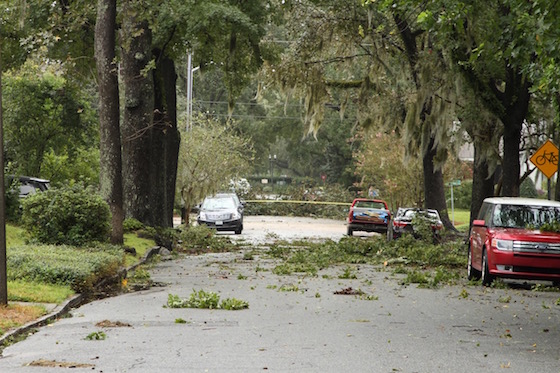In partnership with the University of Georgia Office of Research, Georgia Sea Grant has invested nearly $50,000 in rapid response funding to support six research projects that address challenges related to recovery and response to Hurricane Irma. Rapid response funding allows Georgia Sea Grant to make quick investments in research related to urgent and unanticipated events. The projects funded through this collaboration aim to improve understanding of the hurricane impacts on coastal ecosystems and communities using innovative research methods.
“Collaboration with Georgia Sea Grant has enabled timely investments in research projects that will expand our knowledge and lead to practical insights that guide response and recovery to hurricanes,” says UGA Vice President for Research David Lee.
The South Atlantic coast experienced some of the most severe impacts of Hurricane Irma, which made landfall in September 2017. High winds and downed trees caused 1.5 million customers in Georgia to lose power. Wastewater and stormwater systems were inundated with seawater – a situation exacerbated by the loss of electricity to water treatment facilities, pumps and lift stations. The hurricane unveiled weaknesses in manmade and natural infrastructure in Georgia that challenge the resilience of coastal communities.
The selected projects will study these challenges and findings will help inform management decisions made before, during and after a hurricane.
Hurricane Irma Awards:
- Keeping the Lights on after a Hurricane: The Economics of Grid Resilience Infrastructure in Georgia’s Coastal Communities.
Jessica Alcorn, University of Georgia - Using Novel Drone and Time-Lapse Photography Techniques to Monitor Coastal Infrastructure Impacts from Hurricanes and Tidal Surges.
Kimberly Andrews, University of Georgia - Persistent Hydrological Consequences of Hurricane Interactions with the Georgia Coastline.
Paul Miller, University of Georgia - Response of stressed marsh to Hurricane Irma.
Chris Hladik, Georgia Southern University - Supporting Coastal Resiliency by Investigating Tidal Reach, Storm Surge, and Interconnected Factors in Coastal Georgia.
Chris Hintz, Savannah State University - Protecting Georgia’s Coastline: Optimize Material Development for use in Oyster Restoration Projects
Thomas Manning, Valdosta State University
The Georgia Sea Grant College Program is administered through the National Oceanic and Atmospheric Administration and is one of 33 university-based Sea Grant Programs around the country. Georgia Sea Grant unites the resources of the federal government, the state of Georgia and universities across the state to create knowledge, tools, products and services that benefit the economy, the environment and the citizens of Georgia.

